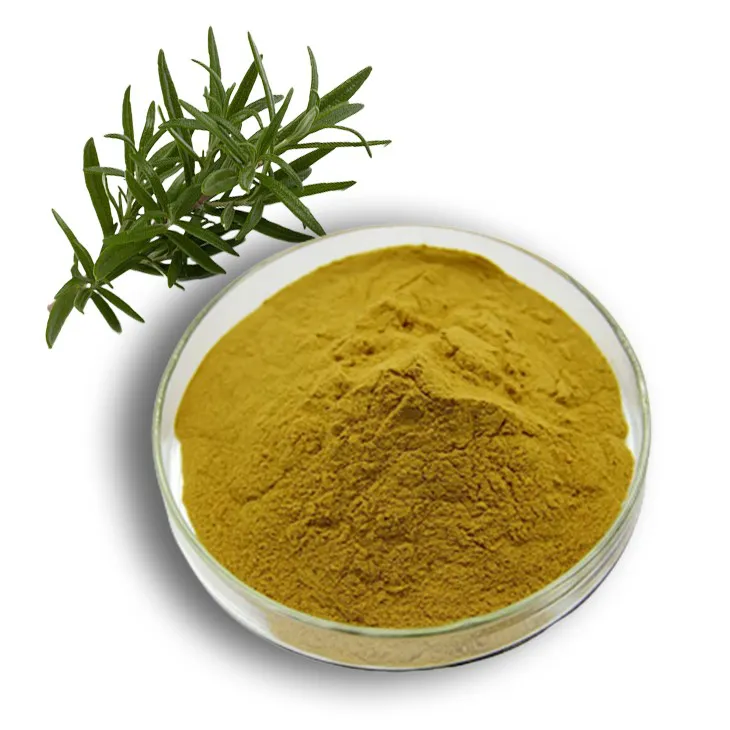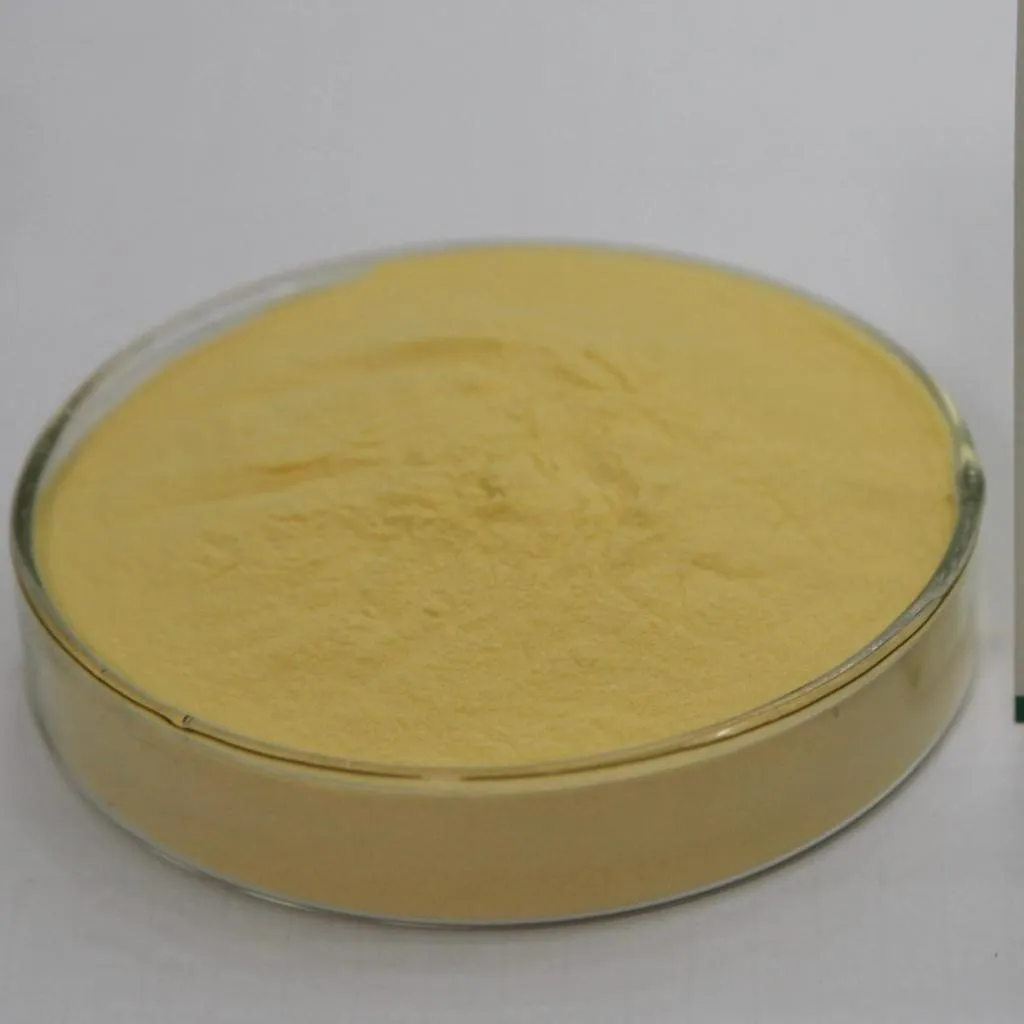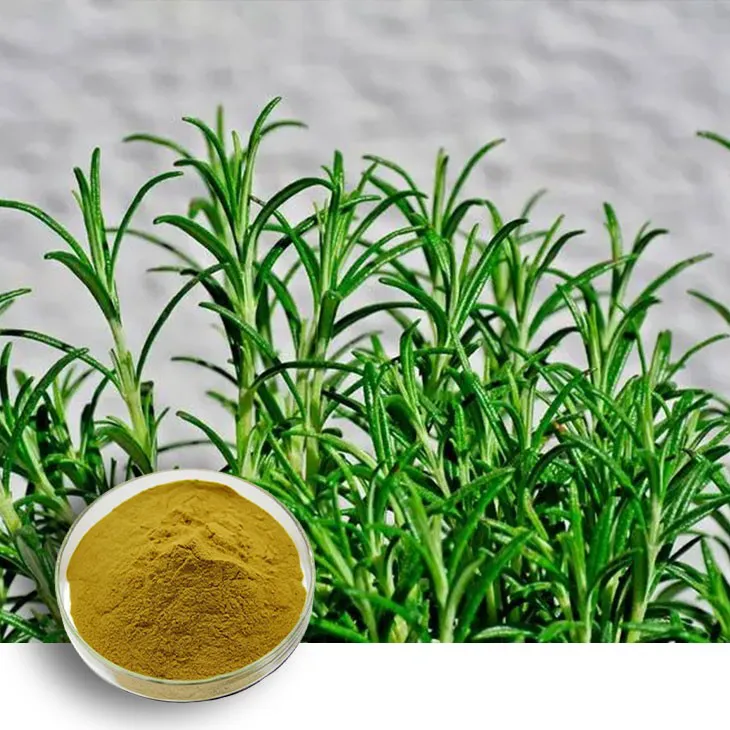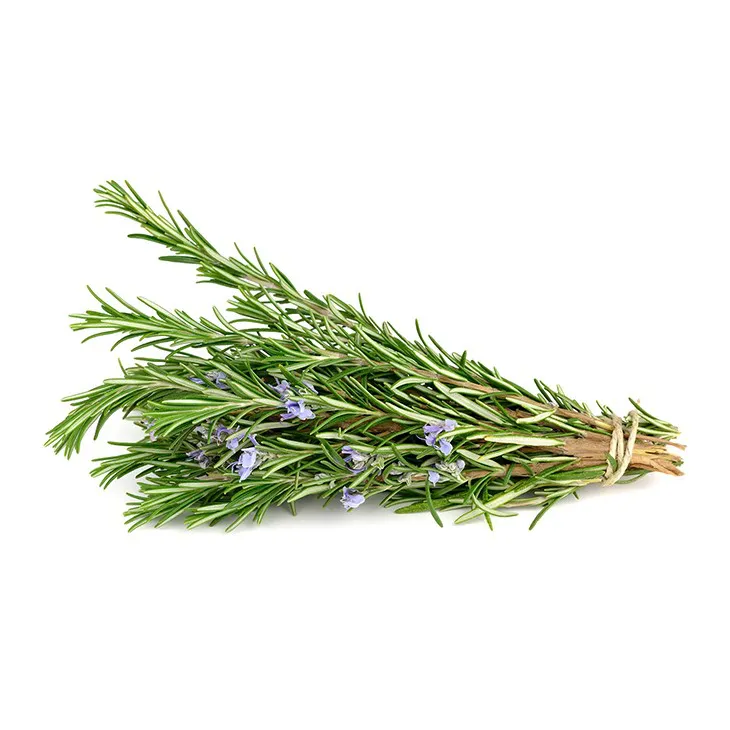- 0086-571-85302990
- sales@greenskybio.com
What is rosemary extract and why use it on the skin?
2024-11-14

1. Introduction to Rosemary extract
Rosemary (Rosmarinus officinalis) is a well - known herb that has been used for various purposes throughout history. Rosemary extract is derived from this herb through different extraction methods. It contains a complex mixture of compounds, including phenolic diterpenes such as carnosic acid and carnosol, flavonoids, and triterpenes.

2. Antioxidant Properties
2.1. The Role of Antioxidants in Skin Health
Oxidative stress is a major factor contributing to skin aging and various skin problems. Our skin is constantly exposed to environmental factors such as ultraviolet (UV) radiation, pollution, and free radicals generated within the body. Antioxidants play a crucial role in neutralizing these free radicals. Free radicals are unstable molecules that can damage cells, including skin cells, by stealing electrons from other molecules. This can lead to a breakdown of collagen and elastin fibers, which are essential for maintaining skin's firmness and elasticity.
2.2. Rosemary extract as an AntioxidantThe phenolic diterpenes in rosemary extract, especially carnosic acid and carnosol, are powerful antioxidants. These compounds can donate electrons to free radicals, thereby stabilizing them and preventing them from causing damage to skin cells. Studies have shown that rosemary extract can scavenge a wide range of free radicals, including superoxide anion radicals, hydroxyl radicals, and lipid peroxyl radicals. This antioxidant activity helps to protect the skin from premature aging, such as the formation of wrinkles, fine lines, and sagging skin.

3. Anti - Inflammatory Benefits
3.1. Inflammation and Skin Conditions
Inflammation in the skin can manifest in various ways, such as redness, swelling, itching, and pain. It can be caused by external factors like allergens, irritants, or microbial infections, as well as internal factors such as an overactive immune response. Chronic inflammation can also contribute to skin diseases like eczema, psoriasis, and acne.
3.2. How Rosemary Extract Reduces InflammationRosemary extract has anti - inflammatory properties that can help to soothe the skin. The flavonoids and diterpenes in the extract are thought to be responsible for this effect. These compounds can inhibit the production of inflammatory mediators, such as cytokines and prostaglandins. By reducing the levels of these inflammatory molecules, rosemary extract can calm redness and swelling, relieve itching, and reduce pain associated with skin inflammation. For example, in cases of mild acne, rosemary extract may help to reduce the redness and inflammation of the pimples.

4. Enhancement of Blood Circulation
4.1. Importance of Blood Circulation for the Skin
Good blood circulation near the skin surface is essential for maintaining healthy skin. Blood transports oxygen, nutrients, and hormones to the skin cells, and also removes waste products and toxins. When blood circulation is poor, the skin may appear dull, lackluster, and may be more prone to developing problems such as dryness, slow wound healing, and cellulite.
4.2. Mechanism of Rosemary Extract on Blood CirculationRosemary extract may enhance blood circulation in the skin. It is believed that certain compounds in the extract can cause vasodilation, which is the widening of blood vessels. This allows for better blood flow, ensuring that skin cells receive an adequate supply of oxygen and nutrients. As a result, the skin can have a healthier glow, and the delivery of beneficial substances to skin cells is improved. Additionally, improved blood circulation may also aid in the removal of waste products from the skin, which can further contribute to its health and appearance.

5. Other Potential Benefits
5.1. Antimicrobial Activity
Rosemary extract may also possess antimicrobial properties. It has been shown to have activity against certain bacteria, fungi, and viruses. In the context of skin health, this can be beneficial as it can help to prevent microbial infections on the skin. For example, it may inhibit the growth of bacteria that are commonly associated with acne, such as Propionibacterium acnes. By reducing the microbial load on the skin, rosemary extract can contribute to a cleaner and healthier skin environment.
5.2. Skin Barrier FunctionThere is evidence to suggest that rosemary extract can help to strengthen the skin's barrier function. The skin barrier is crucial for preventing water loss from the skin and protecting it from external aggressors. Compounds in the rosemary extract may help to improve the integrity of the stratum corneum, the outermost layer of the skin. This can result in a more hydrated skin, as less water is lost through evaporation, and also better protection against environmental pollutants and irritants.
6. How to Use Rosemary Extract on the Skin
6.1. In Skincare Products
Rosemary extract is commonly found in a variety of skincare products. It can be included in creams, lotions, serums, and masks. When choosing a product containing rosemary extract, it is important to check the ingredient list and ensure that the product is suitable for your skin type. For example, if you have oily skin, you may prefer a lightweight lotion or serum with rosemary extract, while those with dry skin may opt for a more emollient cream.
6.2. DIY Skincare with Rosemary ExtractYou can also make your own skincare products using rosemary extract at home. One simple way is to make a rosemary - infused oil. To do this, take fresh rosemary leaves and place them in a clean, dry glass jar. Pour a carrier oil such as olive oil or jojoba oil over the leaves until they are completely covered. Seal the jar and let it sit in a cool, dark place for about two weeks. After that, strain the oil to remove the leaves. This infused oil can be used for massage or as a moisturizer on the skin. Another option is to make a rosemary - based toner. Boil a cup of water and add a handful of fresh rosemary leaves. Let it simmer for a few minutes, then remove from heat and let it cool. Strain the liquid and pour it into a clean bottle. This toner can be used to cleanse and refresh the skin.
7. Precautions and Considerations
7.1. Allergic Reactions
Although rosemary extract is generally considered safe for topical use, some people may be allergic to it. Before using a product containing rosemary extract on a large area of the skin, it is advisable to do a patch test. Apply a small amount of the product to a small area of skin, such as the inside of the forearm, and wait for 24 - 48 hours to see if any redness, itching, or swelling occurs. If there is an allergic reaction, discontinue use immediately.
7.2. Interaction with Other SubstancesWhen using rosemary extract in combination with other skincare products or medications, there is a possibility of interactions. For example, if you are using medications that affect blood clotting, such as anticoagulants, the vasodilatory effect of rosemary extract may potentially enhance the effect of these medications. It is always best to consult a healthcare provider or a dermatologist before using new skincare products or combining different substances on the skin.
FAQ:
Q1: How is rosemary extract made from the rosemary herb?
Rosemary extract is typically made through processes such as solvent extraction. The rosemary plant parts are treated with solvents like ethanol or supercritical carbon dioxide. These solvents help to draw out the active compounds from the plant material. After extraction, the solvent is removed, leaving behind the concentrated rosemary extract which can then be used in various applications, including skin care.
Q2: Are there any potential side effects of using rosemary extract on the skin?
While rosemary extract is generally considered safe for topical use on the skin, some people may experience mild irritation or allergic reactions. This is relatively rare. However, it's always advisable to do a patch test on a small area of skin before using any product containing rosemary extract extensively. If there is redness, itching, or swelling at the patch test site, it's best to avoid using the product.
Q3: Can rosemary extract help with acne - prone skin?
Yes, it can. The anti - inflammatory properties of rosemary extract can be beneficial for acne - prone skin. Acne is often associated with inflammation in the skin. By reducing this inflammation, rosemary extract may help to soothe the skin, reduce redness and swelling associated with acne breakouts, and potentially also have an impact on preventing future breakouts.
Q4: How long does it take to see the effects of using rosemary extract on the skin?
The time it takes to see the effects of rosemary extract on the skin can vary. For some mild skin issues like a bit of redness or dullness, improvement may be noticed within a few days to a couple of weeks of regular use. However, for more complex skin problems, such as chronic inflammation or signs of premature aging, it may take several weeks to a few months of consistent use to observe more significant and long - lasting changes.
Q5: Is rosemary extract suitable for all skin types?
Rosemary extract is generally suitable for most skin types. It can be beneficial for normal skin as it provides antioxidant protection and can enhance the skin's overall health. For dry skin, it may help in promoting blood circulation which can contribute to a more nourished appearance. Oily skin can also benefit from its anti - inflammatory properties which can help with issues like acne and inflammation. Sensitive skin may need to be cautious, but if tolerated, it can offer antioxidant and anti - inflammatory benefits as well.
Related literature
- The Benefits of Rosemary Extract in Skin Care"
- "Rosemary Extract: A Natural Ingredient for Skin Health"
- "Antioxidant and Anti - Inflammatory Properties of Rosemary Extract in Dermatology"
- ▶ Hesperidin
- ▶ citrus bioflavonoids
- ▶ plant extract
- ▶ lycopene
- ▶ Diosmin
- ▶ Grape seed extract
- ▶ Sea buckthorn Juice Powder
- ▶ Beetroot powder
- ▶ Hops Extract
- ▶ Artichoke Extract
- ▶ Reishi mushroom extract
- ▶ Astaxanthin
- ▶ Green Tea Extract
- ▶ Curcumin Extract
- ▶ Horse Chestnut Extract
- ▶ Other Problems
- ▶ Boswellia Serrata Extract
- ▶ Resveratrol Extract
- ▶ Marigold Extract
- ▶ Grape Leaf Extract
- ▶ blog3
-
Cranberry Plants and Skin - care Products.
2024-11-14
-
Oat Straw Extract Powder
2024-11-14
-
Eucommia Ulmoides Extract
2024-11-14
-
Bamboo Leaf extract
2024-11-14
-
American Ginseng Root Extract
2024-11-14
-
Shikone Extract
2024-11-14
-
Curcuma Longa Extract
2024-11-14
-
Black Rice Extract
2024-11-14
-
Green coffee bean Extract
2024-11-14
-
Lemon Juice Powder
2024-11-14
-
Europen Bilberry Extract
2024-11-14





















